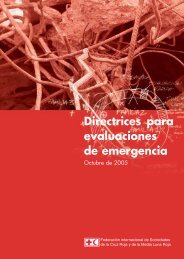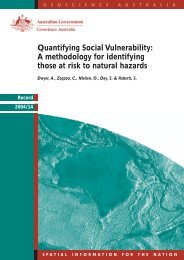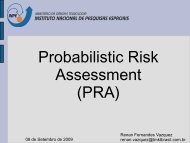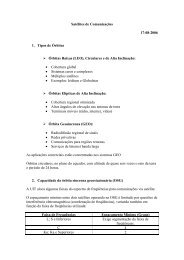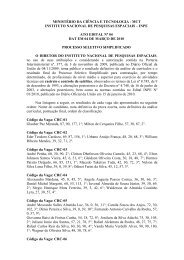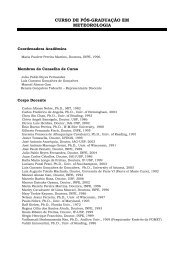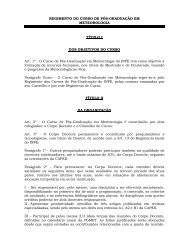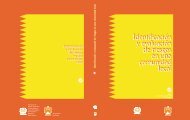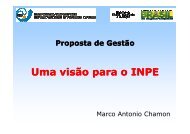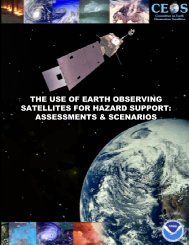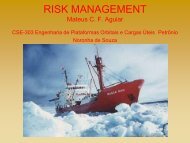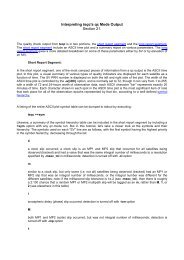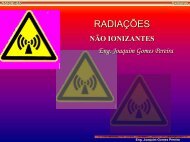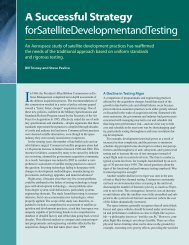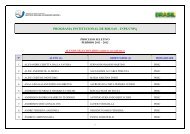Living with Risk. A global review of disaster reduction initiatives
Living with Risk. A global review of disaster reduction initiatives
Living with Risk. A global review of disaster reduction initiatives
You also want an ePaper? Increase the reach of your titles
YUMPU automatically turns print PDFs into web optimized ePapers that Google loves.
ole in defining these future requirements for<br />
RCC functions in the Regions through their<br />
cross-program analysis and wide circulation <strong>of</strong><br />
multi-disciplinary information. At the same<br />
time the predominant, and distinctive, roles<br />
and requirements <strong>of</strong> different geographical<br />
regions around the world are recognized as<br />
being crucial to the most effective accomplishment<br />
<strong>of</strong> the intended objectives. As a broad<br />
conceptual framework <strong>of</strong> RCCs continues to<br />
emerge, attention will proceed <strong>with</strong> individual<br />
Regions considering their specific requirements<br />
and assessing current operational and<br />
technical abilities to meet them.<br />
Wildfire and related hazards<br />
The current state <strong>of</strong> fire science that includes<br />
fundamental fire research and fire ecology and<br />
the results <strong>of</strong> bio-geochemical and atmospheric<br />
sciences research <strong>of</strong> the last decade provide<br />
sufficient knowledge to support decision-making<br />
in fire policy at most management levels <strong>of</strong><br />
responsibility. However, in many countries this<br />
wealth <strong>of</strong> knowledge and expertise is either not<br />
known or is not readily accessible and available<br />
for developing adequate fire policies and related<br />
measures <strong>of</strong> operational management. The<br />
prolonged and severe fire and smoke episode<br />
that occurred in Southeast Asia in 1997-98<br />
demonstrated that the available knowledge<br />
about fire and the related management expertise<br />
was utilized only to a limited extent. These<br />
circumstances led to confusion and uncertainty<br />
at national, regional and international levels <strong>of</strong><br />
responsibility, resulting in delayed decisions<br />
and the late application <strong>of</strong> appropriately targeted<br />
international response to the fire and smoke<br />
emergencies. Retrospectively this could be<br />
explained by the lack <strong>of</strong> a regional Southeast<br />
Asian fire information system.<br />
Considering the wider extent <strong>of</strong> fire issues<br />
around the world, as well as the extent <strong>of</strong> <strong>global</strong><br />
experience in the field. The establishment <strong>of</strong><br />
an institution preliminarily designated as a<br />
"Global Fire Management Facility" was proposed<br />
by a number <strong>of</strong> international conferences<br />
since 1996. On the basis <strong>of</strong> these recommendations<br />
the Government <strong>of</strong> Germany responded<br />
through the Office for the Coordination <strong>of</strong><br />
Humanitarian Assistance in the Ministry <strong>of</strong><br />
Foreign Affairs to establish a Global Fire Monitoring<br />
Center (GFMC) at the Max Planck<br />
Building understanding: development <strong>of</strong> knowledge and information sharing<br />
Institute for Chemistry in Freiburg, Germany<br />
from October 1998.<br />
The GFMC serves an active role in the documentation,<br />
information and monitoring service<br />
functions among the fire science community,<br />
the technical community <strong>of</strong> engineering, technology<br />
development, the primary user community<br />
<strong>of</strong> fire managers, as well as policy makers.<br />
It aims to provide widespread and timely information<br />
in the field <strong>of</strong> long-term strategic planning<br />
for the prevention <strong>of</strong> disastrous wildland<br />
fires as well as enabling preparedness measures<br />
and appropriate responses for fire emergencies.<br />
A worldwide network <strong>of</strong> many institutions and<br />
individuals generates GFMC products <strong>of</strong> both<br />
national and <strong>global</strong> scale. All <strong>of</strong> that information<br />
and data are systematically collected, interpreted<br />
and displayed on the Internet by the<br />
GFMC at www.uni-freiburg.de/fireglobe.<br />
The information remains current, being updated<br />
frequently, and as may be required, daily. It<br />
is then archived for future reference or<br />
research purposes.<br />
Seismic Hazards<br />
While there are many seismological and seismic<br />
engineering institutes around the world,<br />
widely known among the practitioners most<br />
immediately involved for their technical or<br />
informational services. Two representative<br />
examples <strong>of</strong> information centers are cited here<br />
that are particularly engaged in the dissemination<br />
<strong>of</strong> information about the seismic hazards.<br />
The Earthquake Hazards Program <strong>of</strong> the<br />
United States Geological Survey (EHP/<br />
USGS) is part <strong>of</strong> the National Earthquake<br />
Hazards Reduction Program lead by the Federal<br />
Emergency Management Agency. This<br />
program has the primary objective to provide<br />
relevant earthquake science information and<br />
knowledge for reducing deaths, injuries, and<br />
property damage from earthquakes through<br />
understanding <strong>of</strong> their characteristics and<br />
effects and by providing the information and<br />
knowledge needed to mitigate those losses.<br />
The EHP/USGS' role is to provide earth sciences<br />
information and related products for<br />
earthquake loss <strong>reduction</strong>. Information is available<br />
on its website at (www.earthquake.<br />
usgs.gov/ ) to serve its specific goals.<br />
173<br />
4



